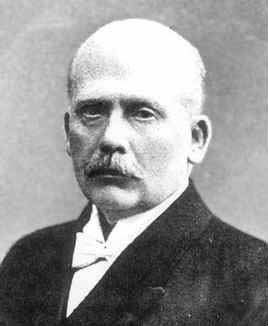


 تاريخ الرياضيات
تاريخ الرياضيات
 الرياضيات في الحضارات المختلفة
الرياضيات في الحضارات المختلفة 
 الرياضيات المتقطعة
الرياضيات المتقطعة
 الجبر
الجبر
 الهندسة
الهندسة 
 المعادلات التفاضلية و التكاملية
المعادلات التفاضلية و التكاملية 
 التحليل
التحليل
 علماء الرياضيات
علماء الرياضيات |
Read More
Date: 17-3-2017
Date: 19-3-2017
Date: 17-3-2017
|
Died: 3 August 1922 in Susice, Czechoslovakia (now Czech Republic)

Mathias Lerch studied first in Prague. After leaving Prague he went to the University of Berlin where he studied during 1884 -85 and was taught by Weierstrass, Kronecker and Fuchs.
In 1886 Lerch joined the teaching staff at the Czech Technical Institute in Prague. Then in 1896 he was appointed to a chair when he accepted a professorship at the University of Fribourg in Switzerland. He returned to the Czech Republic in 1906 where he was appointed professor of mathematics at the Czech Technical Institute in Brno.
Tomás Masaryk was a political leader who liberated the Czechs and Slovaks from Austrian rule. In 1918 Masaryk was elected president of Czechoslovakia. A year after the founding of Czechoslovakia, a new university, named the Masaryk University after the first president, was founded in Brno and Lerch became the first professor of mathematics there in 1920.
Lerch wrote 238 papers, listed in [7], mostly on analysis (about 150 papers) and number theory (about 40 papers). Some of his work is fundamental in modern operator calculus. He also wrote on geometry and numerical methods.
Matti Jutila, in his review of [2], describes Lerch's work in number theory as follows:-
Matyas Lerch (1860-1922) was a remarkable Czech mathematician who published about 250 papers, some fifty of which were devoted to number theory. His favourite topics in number theory included binary quadratic forms, quadratic residues, Gauss sums and Fermat quotients. Also, the Lerch zeta-function is a well-known generalization of Riemann's zeta-function due to him ... this contribution to analytic number theory [is] published in Acta Mathematica in 1887...
In [2] there is a short biography of Lerch and the reviews of his number-theoretic papers given in the Jahrbuch über die Fortschritte der Mathematik are reproduced. Also quoted in full in [2] is the first paper Lerch wrote on number theory and two other papers which he wrote on Fermat quotients. It also contains a summary of a paper on quadratic residues and forms which was published after his death.
Lerch won the Grand Prize of the Paris Academy in 1900 with a work on number theory, a great honour for any mathematician and an even greater achievement for a mathematician from outside France.
He is also well known, however, for his work in analysis. In that topic he studied infinite series, and the gamma function as well as other special functions. He also studied elliptic functions and integral equations.
Often the importance of his work is in the methods which he introduced rather than the specific results themselves. He introduced an auxiliary parameter for meromorphic functions. He also studied the principle of most rapid convergence of a series. He is remembered today for his solution of integral equations in operator calculus and for the 'Lerch formula' for the derivative of Kummer's trigonometric expansion for log G(v).
Books:
Articles:



|
|
|
|
تفوقت في الاختبار على الجميع.. فاكهة "خارقة" في عالم التغذية
|
|
|
|
|
|
|
أمين عام أوبك: النفط الخام والغاز الطبيعي "هبة من الله"
|
|
|
|
|
|
|
المجمع العلمي ينظّم ندوة حوارية حول مفهوم العولمة الرقمية في بابل
|
|
|